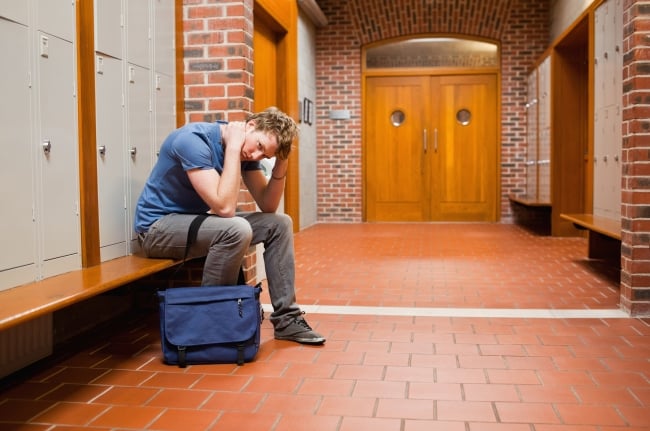You have /5 articles left.
Sign up for a free account or log in.

Wavebreakmedia Ltd./Getty Images Plus
We can no longer deny what’s painfully obvious about boys and young men: many of them are lost and falling through the cracks, as is apparent in most metrics about their education, their jobs and careers, their ability to thrive and, increasingly, to survive. They need a new tool kit that better aligns with the culture’s and their own changing needs. A good place to start: they need to feel better supported and connected than they presently are.
By now, we know boys lag behind in school achievement on nearly every metric. But we may not realize they are falling through the cracks in college—and beyond. The lower grade point averages boys earn in high school follow them throughout college, and when they are faced with academic struggles, many young men spiral into despair, retreating into social isolation or substance abuse, despite efforts from professors and academic advisers. The American College Health Association has found that nearly a third of male college students feel “hopeless” at least some of the time (with 10 percent feeling hopeless “most” or “all” of the time), and about half report challenges handling academics.
Things aren’t much better in the workplace, where fewer young men, in general, are working, and where even the percentage of college-educated men working is on the decline. When men do work, they are, on average, 10 percent less productive than women. Perhaps it’s no surprise that older boys and younger men are suffering rates of anxiety and depression far higher than we realize—both of which fuel their epidemic levels of death by suicide and loneliness (exacerbated by the dearth of romance and sex in their lives: 63 percent of men under 30 describe themselves as single, versus 34 percent of women the same ages).
Many educators and parents I’ve worked with lament that boys simply don’t want to talk, that they aren’t comfortable with sharing their inner struggles. Boys will be boys, right? (Or is this the adults’ discomfort?) Some of us know otherwise. In my work with boys’ schools, I hear from boys, more and more, about their struggles that too often go unspoken and unnoticed. Here are some examples I’ve heard recently:
“The hardest thing about my sadness is that I feel so alone, like no one else feels this way.”
“When my grades drop, I feel like a total failure. Everyone seems to be succeeding but me.”
And this from a middle schooler: “I see a lot of girls wearing T-shirts that say ‘The Future Is Female,’ but where do I fit into that? Where do any boys fit into that?”
There is a common thread to boys’ deeper struggles: disconnect and alienation. Young men are far less likely to seek mental health help when they need it and don’t do a good job of creating emotional safety nets. As a 2023 Swedish study found, for all of their gendered progress, young men are still navigating emotional suffering with a silent, grin-and-bear-it mentality made far worse due to “insufficient social support.” We see this playing out in the mass shooting epidemic and in the growing numbers of older boys lured into the so-called manosphere.
One college-aged student I interviewed for my book told me that, during high school, his inability to handle his depression by himself led to self-loathing, which led to spirals of shame, and, in turn, self-isolation—and suicidal thoughts.
Perhaps the most viable solution for a generation that mostly trusts itself lies in moderated peer guidance and support. The program Becoming a Man offers boys from at-risk communities mentoring circles, where they learn to share their struggles and support each other. When I visited one of these circles, a 12th grader who was failing two classes told his group that the only reason he was still coming to school was “because of you guys and the ways you keep me going.”
At the University of Virginia, counselors discovered that 75 percent of students first reached out to a peer when they were distressed, compared to just 11 percent who reached out to a faculty or staff member. Project Rise, a peer counseling program created in 2006 by a group of Black students at UVA, helps to address this need for peer support.
Mental health apps, such as MindShift, Trill and Stop, Breathe & Think, also offer teens and young adults hands-on tools for navigating anxiety and depression—and can be used anywhere, anytime, in complete anonymity, something males of all ages prefer. Given how much shame and fear boys and young men experience around their mental health struggles and with discussing them, they could greatly benefit from mental health apps designed just for them, so they can find the commiseration and empathy that feels uniquely male.
Given the growing din of distress signals, it would make sense that two- and four-year institutions offer more intervention programs for young men. But few, if any, exist beyond a growing number of programs for men of color, such as the one at UVA. Another program, called Bold Eagles, at Florida Gulf Coast University, helps young men navigate their masculine identities while managing their mental health struggles, stressors and other emotions.
More such programs are clearly needed. At the least, colleges should promote mental health apps and create peer support groups, recruiting male athletes (especially football, basketball and lacrosse players) and fraternity members to take part initially, since they typically enjoy considerable social clout among their peers.
There’s no question about it: young people who feel more emotionally connected within their families and school communities experience far greater degrees of well-being. Boys and young men need help from their schools and their colleges to feel more connected—and, just as important, to know they aren’t alone.




